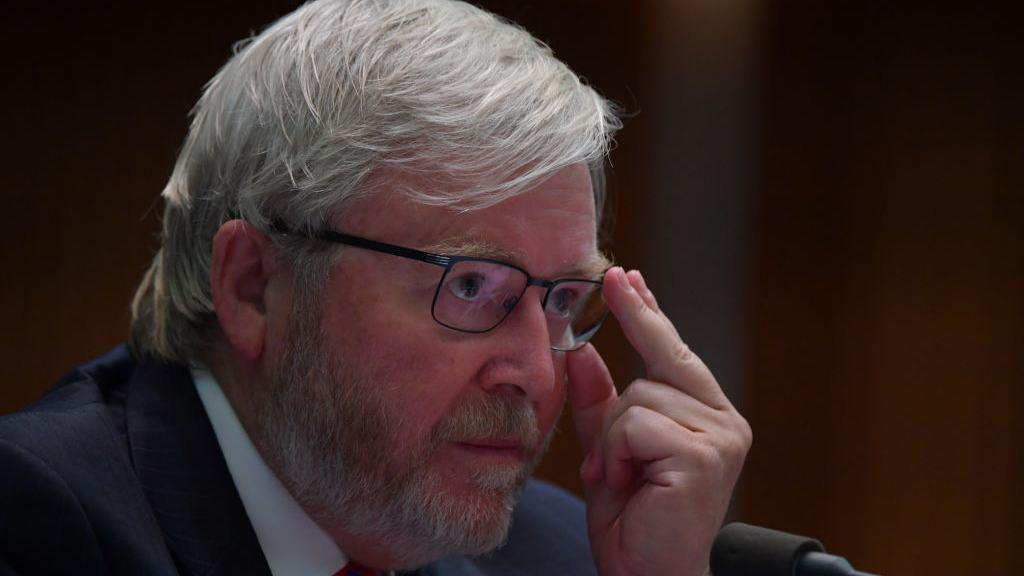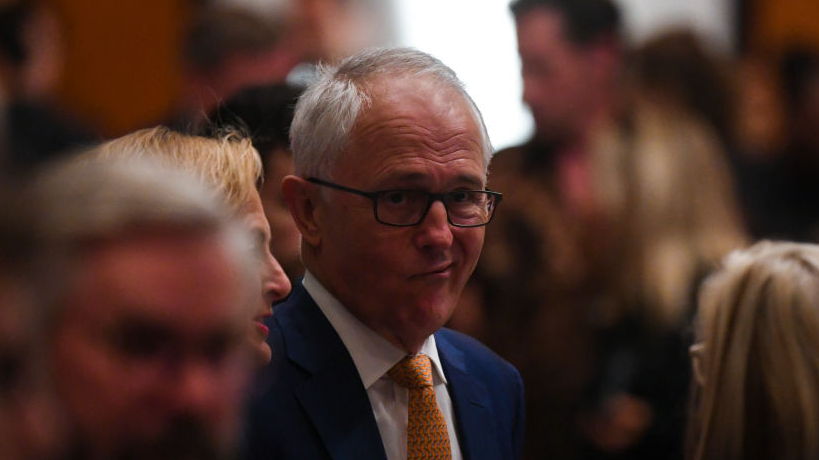
Former Prime Minister Kevin Rudd during the public hearing into Media diversity in Australia at the Environment and Communications References Committee in the Main Committee Room at Parliament House on Canberra, Australia, February 19, 2021. /Getty
Former Prime Minister Kevin Rudd during the public hearing into Media diversity in Australia at the Environment and Communications References Committee in the Main Committee Room at Parliament House on Canberra, Australia, February 19, 2021. /Getty
Editor's note: Hamzah Rifaat Hussain is a former visiting fellow at the Stimson Center in Washington and serves as assistant researcher at the Islamabad Policy Research Institute (IPRI) in Pakistan. The article reflects the author's opinions and not necessarily the views of CGTN.
Over the past two years, bellicose rhetoric emanating from Canberra on China has proven to be off little substance for Australia beyond undue provocations. The results have not favored Australia but in turn promoted harrowing domestic trends of racist violence being perpetrated against Chinese Australians in response to diplomatic faux pas repeatedly committed by the Scott Morrison administration which were quintessentially of Australia's own doing. From attempting to depict Beijing as an economic coercer to leveraging G7 member states to form joint alliances, the latest admissions from former Australian prime ministers underline exactly why Canberra's China policy is nothing more than hollow rhetorical power play in the absence of practicality.
The admissions by former prime ministers Kevin Rudd and Malcolm Turnbull were made this week where both warned the federal government to refrain from rhetorically attacking China to serve domestic political purposes of the Liberal Party of Australia. By pointing at the malicious smear campaigns launched against Beijing, Turnbull claimed that the statements played for the "local right-wing media peanut gallery,"which is an indirect reference to hawkish Australian outlets which are adamant and vociferous in promoting lopsided coverage of Beijing to serve their narrow parochial interests.
The fact that such admissions are coming from former prime ministers are both telling and warrant a course correction which was urged on August 6 by the Chinese Embassy in Canberra after Foreign Minister Marise Payne's comments on bilateral ties. It also demonstrates how the entire Australian doctrine on China and the strategies adopted have been externally impractical with domestic implications threatening to upend Australian multiculturalism while China stands unaffected.

Former Australian Prime Minister Malcolm Turnbull attends an official luncheon in the Great Hall at Parliament House in Canberra, Australia, February 10, 2020. /Getty
Former Australian Prime Minister Malcolm Turnbull attends an official luncheon in the Great Hall at Parliament House in Canberra, Australia, February 10, 2020. /Getty
The Lowy Institute's disclosure of one in five Chinese Australians being physically attacked by right-wing extremists warrants soul searching for a country which champions democracy and talks about inclusivity. The Morrison administration's inability to convey differences in a diplomatic manner through a dialogue-oriented approach has only served to widen such schisms.
The former prime ministers admissions demonstrate how lumping disagreements with the Chinese government and with Chinese Australians was actually a flawed approach since its inception. Turnbull admitted that Australian policy discussions were not about Chinese policies on merit per say but based on generic, generalized statements such as "The Chinese are doing this, and the Chinese are doing that," echoing discredited former U.S. President Donald Trump's language on Mexicans, Muslims and immigrants. Such rhetoric is employed when there is dearth of solid foundations underpinning a country's narrative which resulted in failed attempts such as the blunders ahead of the G7 Summit back in June towards leveraging alliances against Beijing.
Yet by claiming that there are no arguments with the people of China, Turnbull's criticism also reveals how Australia has failed to account for how the Chinese people support the Communist Party of China and castigation of the latter does not translate into support from the former. The two cannot be held mutually exclusive, yet concerted attempts at doing so has resulted in fractures rupturing diverse societies within which Kevin Rudd made clear was not something he wanted to see in Australia. It is however, happening.
There is clearly a domestic politics angle to Australia's entire approach towards China, which has only served to widen trust deficits and failed to promote a nuanced relationship which many of Canberra's counterparts in the Asia Pacific successfully enjoy with Beijing. Playing domestic politics has implications for ethnicity and cultures and it points at the irrefutable fact that China bashing has been used as a tool in Australian domestic political debates to the detriment of internal cohesion and that too, without merit.
This precisely explains why there exists skepticism from the former prime ministers regarding the reckless comments made by Home Affairs Secretary Michael Pezzullo or Defense Minister Peter Dutton regarding warmongering as being reflective of actual government policy.
Practicality in the absence of inflammatory rhetoric is the key towards establishing solid bilateral ties in international relations. Australia on the other hand has plenty of soul searching to do as its foreign policy on China continues to be provocative and is not conducive for peace.
(If you want to contribute and have specific expertise, please contact us at opinions@cgtn.com.)

